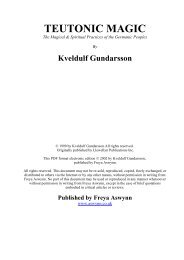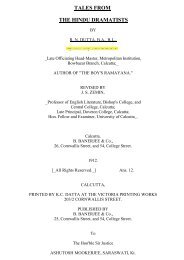Untitled - Awaken Video
Untitled - Awaken Video
Untitled - Awaken Video
You also want an ePaper? Increase the reach of your titles
YUMPU automatically turns print PDFs into web optimized ePapers that Google loves.
Chapter 2. Connections 46<br />
of noble parentage, shape good lives, but as for those people that become the<br />
victims of misfortune, it is the evil norns that are responsible’. ” 35<br />
However, if the concept of the future was, at best, hazy for the ancients, then so<br />
was the idea of predestine. There are quite a large number of folktales where “fate”<br />
is cheated and an equally large number where fate is not cheated although good<br />
attempts were made. The point is that, for the ancients, the future was not fixed<br />
absolutely but only tentatively.<br />
It’s a fairly common belief that most early peoples believed in a fixed destiny. 36<br />
Unfortunately, the names Urð (cognate:“weird”; OE Wyrd), Verdandi, and Skuld<br />
are often translated in the classical fashion to mean “Past,” “Present,” and “Future.”<br />
It is also necessary to consider that not only do modern scholars tend to view the<br />
Norns in such a fashion, but that by Snorri’s time Christianity had a solid foothold<br />
in the northern countries.<br />
“It is also clear, however, from all that has been presented that the Christianization<br />
of the pagan Germanic peoples eventually must have created very<br />
great conceptual problems for them. The temporal reorientation toward<br />
the future, which the Christian conception stresses so strongly, involved a<br />
180-degree wrench away from the past toward a future that did not even exist<br />
prior to Christianization . . . . The term (Wyrd) comes to denote a somewhat<br />
ambiguous concept in Christian times; sometimes it seems to refer to the<br />
will of God, at others to something like Fortune (and, as such, subservient<br />
to God’s will), but it was there forcing itself meaningfully into the speech<br />
of those new Christians who struggled to reconcile it somehow with their<br />
recently acquired Christian orientation and belief.” 37<br />
Because Christianization occurred prior to the recording of the eddaic and sagaic<br />
literature (since anyone who was capable of writing in the roman script had been<br />
trained by the Church), one needs to be very careful not only in the translation-interpretation<br />
but also in the content of what was actually written. In any case, it is obvious from<br />
the time of Tacitus down that the early Germanic people held some concept of<br />
dispensers of destiny or ørlög, but information is lacking in the northern literature<br />
as to the nature of what was actually dispensed. Until the early part of this century,<br />
there was a living tradition among the Norwegian Samí (Laplanders) of the three<br />
Goddesses of childbirth who were known as the Daughters of Madderakka. Their<br />
35 Snorri, p. 18.<br />
36 This is another area where people tend to ignore the evidence as it is presented by the<br />
anthropologists. Moderns often hold set beliefs and then ”page through history books” looking for<br />
the evidence that they are right. Getting into the habit of reading anthropology texts from front<br />
to back with an open mind is a skill that can be learned and cultivated.<br />
37 Bauschatz, p. 154.
















